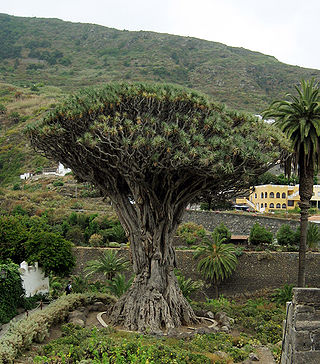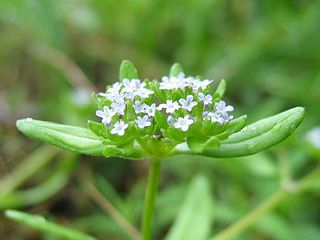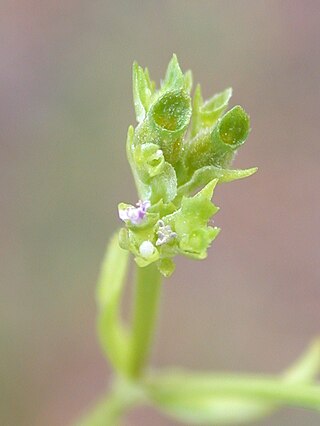
The Caprifoliaceae or honeysuckle family is a clade of dicotyledonous flowering plants consisting of about 860 species, in 33, to 42 genera, with a nearly cosmopolitan distribution. Centres of diversity are found in eastern North America and eastern Asia, while they are absent in tropical and southern Africa.

Dracaena is a genus of about 120 species of trees and succulent shrubs. The formerly accepted genera Pleomele and Sansevieria are now included in Dracaena. In the APG IV classification system, it is placed in the family Asparagaceae, subfamily Nolinoideae. It has also formerly been separated into the family Dracaenaceae or placed in the Agavaceae.

Valerianella locusta is a synonym for Valeriana locusta, commonly called mâche, cornsalad, or lamb's lettuce, a small, herbaceous, annual flowering plant in the honeysuckle family Caprifoliaceae. It is native to Europe, western Asia and north Africa, where it is eaten as a leaf vegetable.

Podophyllum is a genus of flowering plant in the family Berberidaceae, native from Afghanistan to China, and from southeast Canada to the central and eastern United States. The genus was first described by Carl Linnaeus in 1753.
Leonia is a genus of flowering plants in the family Violaceae. It includes 23 species of small trees or shrubs native to tropical Central and South America, ranging from Guatemala to Bolivia and central Brazil.

Knowltonia is a genus of flowering plants in the family Ranunculaceae. There are 25 species native to South Africa and Latin America. The juice from the stem of many of the species in the genus is a powerful vesicant.

Staphylea, called bladdernuts, is a small genus of 10 or 11 species of flowering plants in the family Staphyleaceae, native to temperate regions of the Northern Hemisphere. The highest species diversity is in China, where four species occur.

Olax is a plant genus in the family Olacaceae. The name derives from the Latin, olax (malodorous), and refers to the unpleasant scent of some of the Olax species. Olax is an Old World genus represented by several climbers, some species have leaves and fruits smelling of garlic such as Olax subscorpioidea and Olax gambecola, seeds of the latter are used as condiments in parts of West Africa. In India Olax nana is well known as one of the first species to emerge after forest fires, the shoots growing directly from buried roots.

Valerianella is a genus of flowering plant in family Caprifoliaceae. Many plants of this genus are known by the common name corn salad or cornsalad, although that name most often refers to Valerianella locusta.

Zygophyllum is the type genus of the flowering plant family Zygophyllaceae. The generic name is derived from the Greek words ζυγόν (zygon), meaning "double", and φυλλον (phyllon), meaning "leaf". It refers to the leaves, each of which have two leaflets.

Valeriana congesta, synonym Plectritis congesta, is a species of flowering plant in the honeysuckle family. It is known by several common names, including shortspur seablush and rosy plectritis. It is native to western North America.
Cipuropsis is a genus of flowering plant in the family Bromeliaceae, native to the Caribbean, southern Central America and northwestern South America. The genus was first described by Ule in 1907.

Penaea is a genus of flowering plants in the family Penaeaceae, found in southern South Africa. They have an unusual type of embryo sac development; after two rounds of mitosis, four nuclei are formed at each pole, leading to a mature embryo sac containing four polar groups each with three cells. When found in other taxa, these embryo sacs are termed Penaea-type.
Morisonia is a genus of flowering plants in the family Capparaceae, found across the Americas from the United States to Argentina. They are typically shrubs or small trees. The genus was recently enlarged with New World Capparis species due to existing taxonomic instability.

Valerianella dentata is a synonym for a Valeriana dentata, a species of flowering plant, belonging to the family Caprifoliaceae.
Dendromyza is a genus of flowering plants belonging to the family Santalaceae. They are dioecious stem-parasitic shrubs.

Valeriana graciliflora is a species of flowering plant in the family Caprifoliaceae.

Valerianella muricata is a species of plants in the family Caprifoliaceae.
Josemania is a genus of flowering plant in the family Bromeliaceae, first described in 2016.














